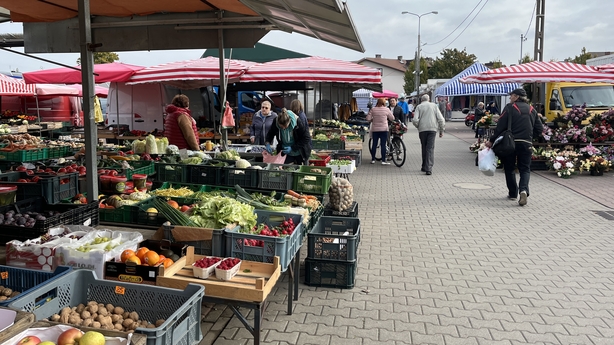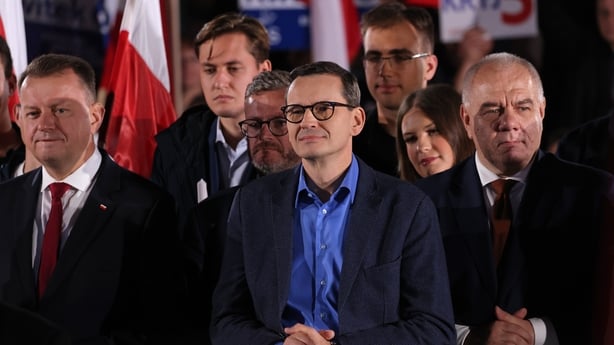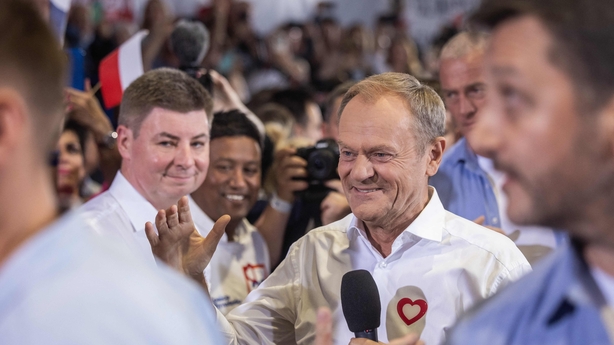In a market place in Minsk Mazowiecki, a town 50km east of Warsaw, stall holders sell local fruit and vegetables.
And countless varieties of sausages, or kielbasy, too.
Others stallholders sell heavy jackets and fur coats for the onset of the long Polish winter.
The town is a safe seat for the ruling nationalist-populist Law and Justice party, which is seeking a third term in government in tomorrow's parliamentary and senate elections.
Many analysts in Poland have described the elections as the important since 1989, the year that Communist rule over the country crumbled.
At the last parliamentary election in 2019, Law and Justice, the country's most popular party, won 50% of the vote in Minsk Mazowiecki, higher than its national vote share of 43% at the time.
"I am for Law and Justice, and nothing more than that," Anna, a meat seller in her 50s, told RTÉ News.
She said that she is against immigration, "like they have in Germany".
Leszek, another meat seller in his 60s, said that Law and Justice "has done a lot for us".
He said the government had helped families, referring to a child benefit scheme which Law and Justice introduced in 2016, and which it has pledged to increase says if it wins re-election.

In its eight years in government, Law and Justice has clashed with EU institutions over immigration policy and the rule-of-law in Poland, and curbed the independence of public media.
Immigration and, given the close proximity of the war in Ukraine, national security, have been the two main topics of the campaign.
Both issues have been driven by Law and Justice, which has hammered home its message through apocalyptic-style videos on social media warning against "illegal immigration", featuring images of riots in other European cities and refugees from Africa and the Middle East.
Prime Minister Mateusz Morawiecki said during this week’s final televised debate on public broadcaster TVP that "we will defend Poles against burning cars like in Paris, Stockholm".

The same message has been echoed by other senior Law and Justice politicians in towns and small cities across the country.
Andrzej Bobinski, editor-in-chief of Polityka Insight, told RTÉ News that Law and Justice has "built a narrative that there is a very dangerous world outside of Poland", and that it is the only party that can "safeguard the traditional, Catholic version of Polish life".
During the campaign, Law and Justice has targeted Brussels and Berlin for meddling in Polish affairs, but the bulk of the party’s criticism has been levelled at Donald Tusk.
"The tool that is being used to attack Donald Tusk is migration and the fact that, at some point, Civic Platform was willing to accept illegal migrants," said Mr Bobinski.

Mr Tusk agreed to a limited EU migrant relocation plan in 2016 during his first term as President of the European Council, a position he held from 2014 to 2019.
The polarised nature of the campaign has been plain to be see in broadcast media coverage too.
Public broadcaster TVP has offered unbalanced coverage of the campaign, favouring the ruling party and criticising Mr Tusk and his centrists on evening bulletins.
Law and Justice has said that independent broadcaster TVN mounted a "de facto campaign" for Mr Tusk.
Immigration is the main issue on the airwaves but voter surveys have shown that the cost-of-living and public healthcare, followed by national security are the three biggest issues that people care about.
Inflation is 10% and stood at 16% for almost a year until last March.
According to the latest polls, support for Law and Justice stands at 35%.
That would translate into 192 seats – short of the required majority of 230 seats in Poland’s 460-seat parliament.
The main centrist opposition Civic Coalition is polling at 30%.
It has tried to campaign on the economy, inflation and women’s rights, supporting access to abortion up to the 12th week of pregnancy.
But inevitably, it could not ignore immigration on the campaign trail.
Mr Tusk has tried to counter Law and Justice’s anti-immigrant narrative by highlighting that the number of work visas issued to foreign nationals by the government is 50 times greater than when his party was last in government in 2015.
If the pollsters are even close to being correct, then Poland is headed for either another nationalist-populist coalition led by Law and Justice (albeit a wafer-thin majority) or, a broad centre-left coalition led by Civic Coalition.
Either way, smaller parties will play an important role in the next parliament.
They include the centre-right Third Way on 11-12%, the Left on 9% and the far-right Confederation on 8%.
Mr Tusk’s Civic Coalition looks highly unlikely to win an outright majority.
In the event that President Andrzej Duda asks him to form a government, he will have to reach out to the Left and the Third Way.
It would be a diverse coalition, but the parties share some common ground.
Civic Coalition and the Left align closely on social issues such as support for same-sex civil partnerships and access to abortion, while Third Way share Mr Tusk’s natural liberal economic instincts.
Some months back, speculation began to mount that the far-right Confederation was set to become a junior coalition partner for Law and Justice after the election.
Both parties oppose abortion and irregular immigration, with the far-right also opposing social security benefits for Ukrainian refugees.
But Confederation’s young leaders have said they want no part in a Law and Justice government and have spent the campaign attacking the ruling party’s handling of inflation and high spending on social security programmes.
Put simply, Law and Justice is short of potential coalition partners.
It owes its current majority to the support of 18 MPs from the nationalist Sovereign Poland party, led by justice minister Zbigniew Ziobro.
Mr Ziobro’s party has failed to distinguish itself from Law and Justice during the campaign, and voters who want a more right-wing version of Law and Justice are more likely to turn to Confederation this time around.
So Law and Justice needs to win roughly 210 seats to stand a chance of leading a coalition.
Turnout will be key.
Law and Justice’s supporters are generally older and live in small towns and rural areas.
And under Poland’s current electoral map, constituencies that are more sparsely populated account for a greater number of seats than urban areas, where the centre and left-wing parties are more popular.
Recent elections in Europe, including the Brexit referendum, have shown that older people are more likely to vote.
At two of Civic Coalition's mass rallies this year, there was a noticeable absence of supporters under the age of 40, which could mean they are not attracting younger voters.
Confusing as it might sound, Poles will also vote on four referendum questions on election day.
Two of the referendum questions deal with immigration – one will ask voters if they are in favour of "illegal migration" and the EU’s latest migrant relocation pact, which Poland and Hungary vetoed in June.
The second immigration-themed question will ask voters if they support the removal of Poland’s steel fence which now borders Belarus to keep immigrants out.
However, the opposition parties had not proposed that the border should be removed.
The referendum topics were announced in August by Law and Justice and the decision to stage the referendums passed by the ruling right-wing coalition’s majority in parliament, with little public discussion beforehand.
Centrist and left-wing opposition parties argue that the questions are leading, and that the ruling party is using the referendums to promote its own parliamentary election agenda.
It has been a bitter and largely negative campaign, waged by two opposing camps that hold very different visions of Poland’s future.
"If we trust the polls, it looks like the opposition will win this and be able to form a government," said Mr Bobinski.
But the task of forming a new government, he said, will be difficult.







